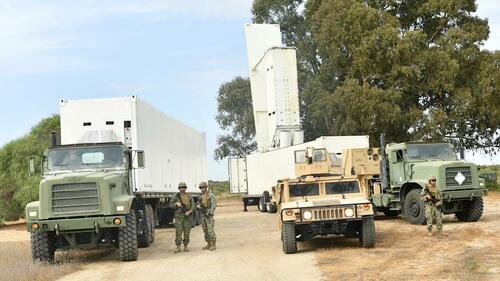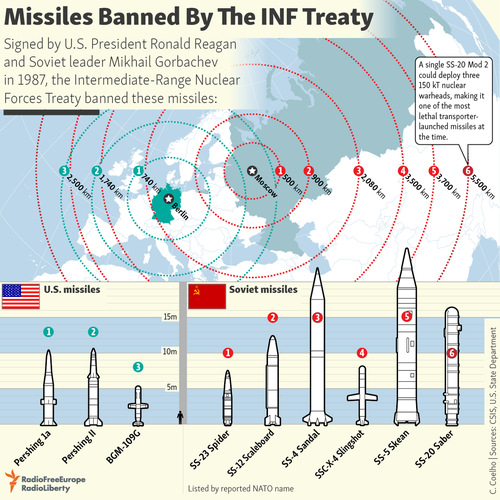
In 2019, the US withdrew from the Intermediate-Range Nuclear Forces (INF) Treaty, which prohibited land-based missile systems with a range of 310 to 3,400 miles. Already Washington has briefly deployed such systems to southeast Asia (Typhon launchers in the Philippines for temporary exercises), which has riled China, but now for the first time nuke-capable missiles will be deployed to Germany.
The US announced Wednesday in relation to the ongoing NATO summit in Washington: "The United States will begin episodic deployments of the long-range fires capabilities of its Multi-Domain Task Force in Germany in 2026, as part of planning for enduring stationing of these capabilities in the future."

"When fully developed, these conventional long-range fires units will include SM-6, Tomahawk, and developmental hypersonic weapons, which have significantly longer range than current land-based fires in Europe," the statement posted to the White House website adds.
There's a widespread belief that the US dropped the INF treaty in the first place so that it could deploy intermediate-range missiles near China. But in 2022, the Russia-Ukraine war kicked off, and much of the West's national security focus since then has been to rebuild Europe's defenses.
As expected, Russia has reacted with fury to the new missile plan for Germany, with Russian Ambassador to the US Anatoly Antonov stating on Telegram Thursday that the move is a "serious mistake" as "such extremely destabilizing steps are a direct threat to international security and strategic stability."
The envoy further said this only "increases the risks of a missile arms race," given that it could unleash "uncontrolled escalation amid dangerously soaring Russia-NATO tensions."
Antonov said that Russia has desired to keep safeguards in place, but "Instead of the desire for peace that Russia has demonstrated many times, the Americans have embarked on the dangerous path of militarism."
He further warned that this brings European states like Germany in the crosshairs and that Moscow's patience is limited. The ambassador posed: "Doesn’t Germany understand that the emergence of American missile assets on German soil will lead to these facilities ending up in Russian crosshairs? This is not saber-rattling, it is the simple logic of a normal person."
The end of Cold War era treaty was negotiated precisely to avoid and reduce weapons build-up in Europe...
If Donald Trump takes the White House after November, it will be interesting to see whether he sticks by these provocative missile expansion plans, or if he halts it while desiring to deescalate tensions over arms placement with an aim of of finding Ukraine peace.
In 2019, the US withdrew from the Intermediate-Range Nuclear Forces (INF) Treaty, which prohibited land-based missile systems with a range of 310 to 3,400 miles. Already Washington has briefly deployed such systems to southeast Asia (Typhon launchers in the Philippines for temporary exercises), which has riled China, but now for the first time nuke-capable missiles will be deployed to Germany.
The US announced Wednesday in relation to the ongoing NATO summit in Washington: “The United States will begin episodic deployments of the long-range fires capabilities of its Multi-Domain Task Force in Germany in 2026, as part of planning for enduring stationing of these capabilities in the future.”

“When fully developed, these conventional long-range fires units will include SM-6, Tomahawk, and developmental hypersonic weapons, which have significantly longer range than current land-based fires in Europe,” the statement posted to the White House website adds.
There’s a widespread belief that the US dropped the INF treaty in the first place so that it could deploy intermediate-range missiles near China. But in 2022, the Russia-Ukraine war kicked off, and much of the West’s national security focus since then has been to rebuild Europe’s defenses.
As expected, Russia has reacted with fury to the new missile plan for Germany, with Russian Ambassador to the US Anatoly Antonov stating on Telegram Thursday that the move is a “serious mistake” as “such extremely destabilizing steps are a direct threat to international security and strategic stability.”
The envoy further said this only “increases the risks of a missile arms race,” given that it could unleash “uncontrolled escalation amid dangerously soaring Russia-NATO tensions.”
Antonov said that Russia has desired to keep safeguards in place, but “Instead of the desire for peace that Russia has demonstrated many times, the Americans have embarked on the dangerous path of militarism.”
He further warned that this brings European states like Germany in the crosshairs and that Moscow’s patience is limited. The ambassador posed: “Doesn’t Germany understand that the emergence of American missile assets on German soil will lead to these facilities ending up in Russian crosshairs? This is not saber-rattling, it is the simple logic of a normal person.”
The end of Cold War era treaty was negotiated precisely to avoid and reduce weapons build-up in Europe…
If Donald Trump takes the White House after November, it will be interesting to see whether he sticks by these provocative missile expansion plans, or if he halts it while desiring to deescalate tensions over arms placement with an aim of of finding Ukraine peace.
Loading…






